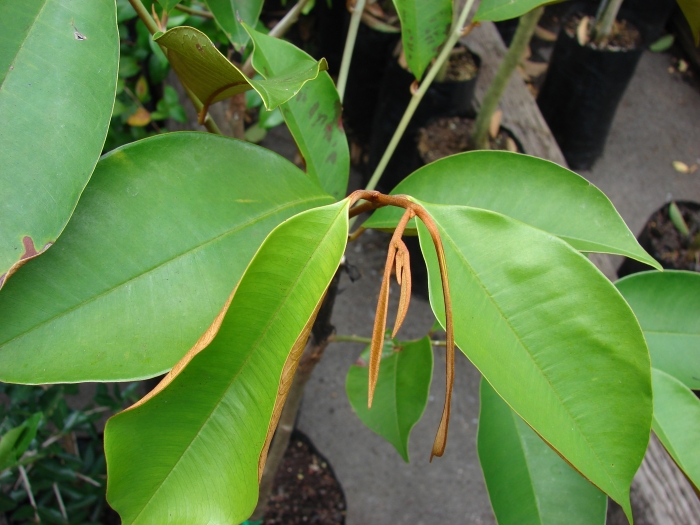Star Apple
(Chrysophyllum cainito)
Star Apple (Chrysophyllum cainito)
/
/

Forest & Kim Starr
CC BY 3.0
Image By:
Forest & Kim Starr
Recorded By:
Copyright:
CC BY 3.0
Copyright Notice:
Photo by: Forest & Kim Starr | License Type: CC BY 3.0 | License URL: https://creativecommons.org/licenses/by/3.0 | Uploader: BotMultichillT | Publisher: Wikimedia Commons | Title: Starr_070906-8589_Chrysophyllum_cainito.jpg | Notes: From fr-wiki {{PD/USA}} |




















Estimated Native Range
Summary
Chrysophyllum cainito, commonly known as Star Apple, is an evergreen tree native to the lowland tropical rainforests of Central America and the West Indies. It can grow up to 25 meters in height with a broad and dense canopy. The leaves are glossy and dark green with a golden brown underside, which is especially noticeable when the wind blows. Star Apple is notable for its round, purple-skinned fruit with a star-shaped pattern in the pulp when cut crosswise. The fruit’s skin and rind contain latex and are not edible, but the sweet, jelly-like flesh is a popular dessert fruit, often served chilled. Greenish-white and yellow-fruited cultivars offer variety in color and taste. The tree produces inconspicuous white flowers during the summer and fall, which are followed by the fruit. The seeds are flattened, light brown, and hard.
Star Apple trees are valued for their ornamental foliage, shade-providing canopy, and delicious fruits. They are used in tropical and subtropical landscapes, often as specimen trees or for fruit production. The tree requires full sun and medium amounts of water, thriving in well-drained soils. While it is not a common commercial crop, it is sometimes grown in home gardens and orchards. It is relatively low-maintenance but can be susceptible to pests such as fruit flies and scales.CC BY-SA 4.0
Star Apple trees are valued for their ornamental foliage, shade-providing canopy, and delicious fruits. They are used in tropical and subtropical landscapes, often as specimen trees or for fruit production. The tree requires full sun and medium amounts of water, thriving in well-drained soils. While it is not a common commercial crop, it is sometimes grown in home gardens and orchards. It is relatively low-maintenance but can be susceptible to pests such as fruit flies and scales.CC BY-SA 4.0
Plant Description
- Plant Type: Tree
- Height: 45-66 feet
- Width: 25-40 feet
- Growth Rate: Moderate
- Flower Color: White
- Flowering Season: Summer, Fall
- Leaf Retention: Evergreen
Growth Requirements
- Sun: Full Sun, Part Shade
- Water: Medium
- Drainage: Medium, Fast
Common Uses
Bird Garden, Butterfly Garden, Drought Tolerant, Edible*Disclaimer: Easyscape's listed plant edibility is for informational use. Always verify the safety and proper identification of any plant before consumption., Fragrant
Natural Habitat
Native to the lowland tropical rainforests of Central America and the West Indies
Other Names
Common Names: Achras Cainito, Cainito, Caimito
Scientific Names: , Chrysophyllum cainito, Chrysophyllum caimito, Chrysophyllum caeruleum, Chrysophyllum jamaicense, Chrysophyllum cainito var. portoricense, Cainito pomiferum, Chrysophyllum bonplandii, Chrysophyllum cainito var. caeruleum, Chrysophyllum cainito var. jamaicense
GBIF Accepted Name: Chrysophyllum cainito L.